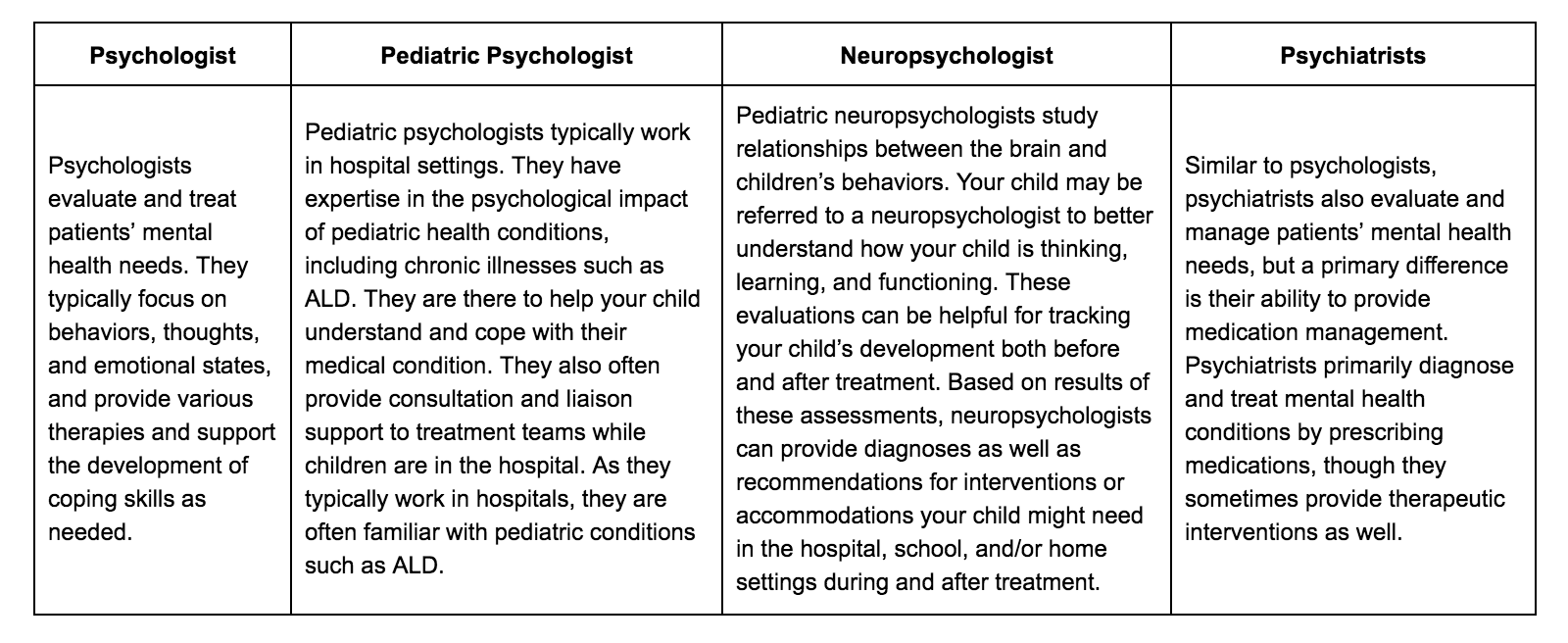Connecting to support resources
As you prepare for your child’s treatment, know that you are not alone in this journey. There are many resources available to support you and your family before, during, and after treatment including emotional, financial, and educational resources. Support can look different for everyone. Some people lean on family and friends, others find comfort in talking to families who have gone through similar experiences or healthcare professionals who have experience working with families affected by ALD. As noted above, some turn to practices such as taking walks, exercising, meditating, practicing mindfulness, and/or participating in counseling or therapy. As you begin to think about various support options, consider which suit you and your family’s needs best as different support options work for different people. Try not to be discouraged if you try something and don’t end up liking it as there are many alternatives!
We would like to acknowledge that there will likely be some barriers to accessing support resources depending on your location, financial situation, time, and childcare availability. In response, we tried to provide a range of options to suit families' unique situations.
Social Interaction: Groups, family, friends, etc.
If you find that connecting with other people is generally helpful for you, then family, friends, and ALD-related support groups may be great resources for you. If you decide to lean on family, friends, and/or support groups, it is important that you surround yourself with positive and affirming people as being around a lot of negativity will be unhelpful. Meeting with other families affected by ALD is a great way to learn from and connect with people who share a similar life experience. Be mindful that members in these groups may be in different stages of their ALD journey than you, so you may hear about experiences beyond your family’s current stage. Similar to friends and family, it is important to make sure you “click” with fellow ALD families. Some support group networks include ALD Alliance, ALD Connect Community Calls, Be The Match, and Facebook groups (links below).
Healthcare professionals
Being in a healthcare setting may feel intimidating, nerve-wracking, and foreign. Fortunately, there are many resources available to you and your family to relieve feelings of anxiety, stress, and fear while you are away from home. In this section we will review various resources you can ask about before, during, and after your child’s treatment.
Social Workers
Social workers are an important resource to ask about at your treatment center. You might be automatically connected to one if they are on your child’s care team; if not, ask your doctor how you can get connected to one. Like you, social workers are advocates for your child and family. They are there to support you and provide helpful resources throughout the treatment process. Social work services range from offering counseling and emotional support; providing care coordination services; helping you to address issues related to transportation, housing, financial resources; connecting you with support groups and therapies; providing assistance with problem solving and advocacy for you and your family; supporting communication between you and your child’s healthcare team; and more. Social worker responsibilities may vary based on your treatment center.
Child Life Specialists
Another resource your treatment center may offer is child life services. Child life specialists are trained professionals who are typically part of the healthcare team. Their primary duty is to offer children and families social and emotional support and comfort during their time at the hospital. Some services offered may include age-appropriate medical play or distractions to help reduce fear and stress around upcoming procedures, arts and creative outlets, resources and support for managing and coping with difficult procedures and treatments, family education, and more. Your family’s well-being at the hospital is their top priority.
Other Behavioral Health Services
Other behavioral health resources that may be available at your child’s treatment center include psychologists, pediatric psychologists, neuropsychologists, and psychiatrists. The four professions sound similar, but have key differences:
As you prepare for your child’s treatment, know that you are not alone in this journey. There are many resources available to support you and your family before, during, and after treatment including emotional, financial, and educational resources. Support can look different for everyone. Some people lean on family and friends, others find comfort in talking to families who have gone through similar experiences or healthcare professionals who have experience working with families affected by ALD. As noted above, some turn to practices such as taking walks, exercising, meditating, practicing mindfulness, and/or participating in counseling or therapy. As you begin to think about various support options, consider which suit you and your family’s needs best as different support options work for different people. Try not to be discouraged if you try something and don’t end up liking it as there are many alternatives!
We would like to acknowledge that there will likely be some barriers to accessing support resources depending on your location, financial situation, time, and childcare availability. In response, we tried to provide a range of options to suit families' unique situations.
Social Interaction: Groups, family, friends, etc.
If you find that connecting with other people is generally helpful for you, then family, friends, and ALD-related support groups may be great resources for you. If you decide to lean on family, friends, and/or support groups, it is important that you surround yourself with positive and affirming people as being around a lot of negativity will be unhelpful. Meeting with other families affected by ALD is a great way to learn from and connect with people who share a similar life experience. Be mindful that members in these groups may be in different stages of their ALD journey than you, so you may hear about experiences beyond your family’s current stage. Similar to friends and family, it is important to make sure you “click” with fellow ALD families. Some support group networks include ALD Alliance, ALD Connect Community Calls, Be The Match, and Facebook groups (links below).
- ALD Alliance
- Contact Miranda McAuliffe (email: [email protected]; phone: 917-860-3756) or Elisa Seeger (email: [email protected]; phone: 917-750-9390)
- ALD Connect Community Calls
- ALD Connect coordinates periodic telephone conference calls to provide peer support. Whether it’s men with AMN, women with AMN, or newborn screening parents, ALD Connect community calls offer support and deepen connections with each other.
- Be the Match Telephone Support Groups
- Courageous Parents Network
- FamilyVoices
- Facebook: ALD Support Group (1.4k members)
- This group is available to families who are affected by ALD/AMN. The group comes together to give support, compassion and strength to each other, and deal with the different stages of ALD. This is a closed group so an administrator will have to approve your membership once a request to join the group has been made.
- Facebook: ALD Family Support Group (557 members)
- This group is available to support parents and direct family members dealing with ALD from pre-diagnosis (waiting for VLCFA confirmation), throughout transplant, post-transplant, and those who have lost their ALD warriors but would like to continue to fight this battle and help others.
Healthcare professionals
Being in a healthcare setting may feel intimidating, nerve-wracking, and foreign. Fortunately, there are many resources available to you and your family to relieve feelings of anxiety, stress, and fear while you are away from home. In this section we will review various resources you can ask about before, during, and after your child’s treatment.
Social Workers
Social workers are an important resource to ask about at your treatment center. You might be automatically connected to one if they are on your child’s care team; if not, ask your doctor how you can get connected to one. Like you, social workers are advocates for your child and family. They are there to support you and provide helpful resources throughout the treatment process. Social work services range from offering counseling and emotional support; providing care coordination services; helping you to address issues related to transportation, housing, financial resources; connecting you with support groups and therapies; providing assistance with problem solving and advocacy for you and your family; supporting communication between you and your child’s healthcare team; and more. Social worker responsibilities may vary based on your treatment center.
Child Life Specialists
Another resource your treatment center may offer is child life services. Child life specialists are trained professionals who are typically part of the healthcare team. Their primary duty is to offer children and families social and emotional support and comfort during their time at the hospital. Some services offered may include age-appropriate medical play or distractions to help reduce fear and stress around upcoming procedures, arts and creative outlets, resources and support for managing and coping with difficult procedures and treatments, family education, and more. Your family’s well-being at the hospital is their top priority.
Other Behavioral Health Services
Other behavioral health resources that may be available at your child’s treatment center include psychologists, pediatric psychologists, neuropsychologists, and psychiatrists. The four professions sound similar, but have key differences:
Education
You may have concerns about your child having to miss school while receiving treatment. There are some options to continue education at your child’s treatment center, such as in-patient schooling, that may be worth asking about depending on your child’s physical and emotional state post-treatment. There are also community-based resources available to assist with the transition back to school, which include school liaisons, school psychologists, and school social workers.
Hospital Tutoring Programs
Local school districts may offer in-person tutoring programming during a child’s hospital admission and subsequent transition to an outpatient setting, until a final discharge home. Your child may have to dis-enroll from their home school district and enroll in the local public school near the hospital to participate. For interested families, a hospital social worker provides application materials and coordinates care with the local hospital tutors.
School Liaisons
When school advocacy support is requested, social workers are available to help bridge the gaps between the hospital and school faculty. If a student already has formal educational supports in place, such as a 504 Accommodation Plan or Individualized Education Program (IEP), there is often an assigned member of their education plan team who will act as a liaison. This individual can collaborate with the hospital social worker to obtain supporting documentation and discuss needs or recommendations. If a student does not have formal educational support in place, the school liaison may be the school social worker, counselor, assistant principal, etc. After your child’s treatment, the assigned individual can assist with the transition back to school. Depending on recommendations from your child’s care team, your child may not return to school for some time. In this case, a school liaison can refer you to in-patient or home-bound educational services.
School Psychologists
School psychologists promote positive learning environments for students by addressing academic, social, emotional, and behavioral needs. They are certified professionals trained to administer psychological and academic assessments to evaluate students’ needs within the educational setting. They make recommendations, implement evidence-based prevention and intervention programs, monitor progress, and equip students with the skills and tools needed to thrive in the classroom. School psychologists communicate with parents and teachers frequently to provide updates on student progress. They are also trained to work with diverse populations to create developmentally and culturally appropriate plans.
School Social Workers
Similar to school psychologists, school social workers also address students’ academic, social, emotional, and behavioral needs. While school psychologists have more expertise in special education and implementing assessments and programs in school settings, school social workers focus more on student’s success and well-being in and outside of school. They may provide individual and group therapy or counseling in the school setting. They also act as a liaison between students, parents, teachers, school staff, and the community. They work closely with students and families to assist with community referrals, home support resources, finances, transitioning from home to school, and long-term case management.
School Counselors
School counselors are certified/licensed educators who work in elementary, middle school, and high schools to support efforts to improve student success and outcomes. They develop and implement a school counseling program so that all students can thrive. In addition, they help students achieve their academic, personal, and career goals. They may offer short-term counseling services, collaborate with teachers, parents, and administrators to meet students’ needs, help students individually with academic planning and goal setting, and advocate for changes to improve equity and access to opportunities for all students.
You may have concerns about your child having to miss school while receiving treatment. There are some options to continue education at your child’s treatment center, such as in-patient schooling, that may be worth asking about depending on your child’s physical and emotional state post-treatment. There are also community-based resources available to assist with the transition back to school, which include school liaisons, school psychologists, and school social workers.
Hospital Tutoring Programs
Local school districts may offer in-person tutoring programming during a child’s hospital admission and subsequent transition to an outpatient setting, until a final discharge home. Your child may have to dis-enroll from their home school district and enroll in the local public school near the hospital to participate. For interested families, a hospital social worker provides application materials and coordinates care with the local hospital tutors.
School Liaisons
When school advocacy support is requested, social workers are available to help bridge the gaps between the hospital and school faculty. If a student already has formal educational supports in place, such as a 504 Accommodation Plan or Individualized Education Program (IEP), there is often an assigned member of their education plan team who will act as a liaison. This individual can collaborate with the hospital social worker to obtain supporting documentation and discuss needs or recommendations. If a student does not have formal educational support in place, the school liaison may be the school social worker, counselor, assistant principal, etc. After your child’s treatment, the assigned individual can assist with the transition back to school. Depending on recommendations from your child’s care team, your child may not return to school for some time. In this case, a school liaison can refer you to in-patient or home-bound educational services.
School Psychologists
School psychologists promote positive learning environments for students by addressing academic, social, emotional, and behavioral needs. They are certified professionals trained to administer psychological and academic assessments to evaluate students’ needs within the educational setting. They make recommendations, implement evidence-based prevention and intervention programs, monitor progress, and equip students with the skills and tools needed to thrive in the classroom. School psychologists communicate with parents and teachers frequently to provide updates on student progress. They are also trained to work with diverse populations to create developmentally and culturally appropriate plans.
School Social Workers
Similar to school psychologists, school social workers also address students’ academic, social, emotional, and behavioral needs. While school psychologists have more expertise in special education and implementing assessments and programs in school settings, school social workers focus more on student’s success and well-being in and outside of school. They may provide individual and group therapy or counseling in the school setting. They also act as a liaison between students, parents, teachers, school staff, and the community. They work closely with students and families to assist with community referrals, home support resources, finances, transitioning from home to school, and long-term case management.
School Counselors
School counselors are certified/licensed educators who work in elementary, middle school, and high schools to support efforts to improve student success and outcomes. They develop and implement a school counseling program so that all students can thrive. In addition, they help students achieve their academic, personal, and career goals. They may offer short-term counseling services, collaborate with teachers, parents, and administrators to meet students’ needs, help students individually with academic planning and goal setting, and advocate for changes to improve equity and access to opportunities for all students.


